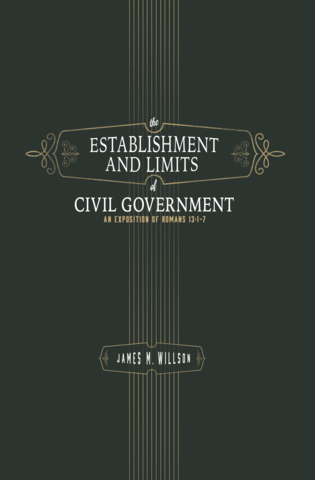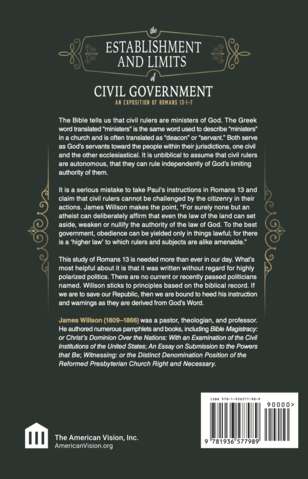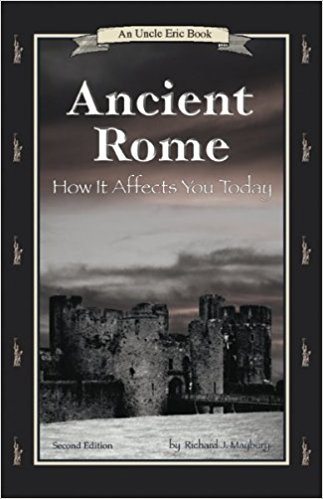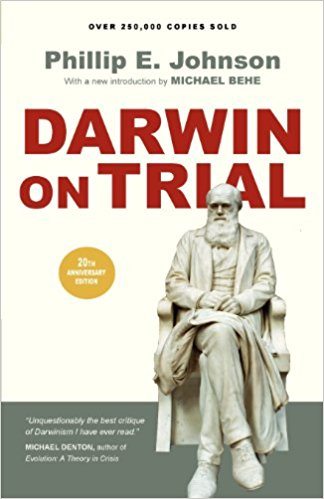Establishments and Limits of Civil Government
Original price was: $20.00.$13.00Current price is: $13.00.
The Bible tells us that civil rulers are ministers of God. The Greek word translated ministers is the same word used to describe ministers in a church. There are civil ministers and church ministers. Both serve as God’s ministers within their jurisdictions. It is unbiblical to assume that civil rulers are autonomous, that they can legitimately rule independent of Gods limiting authority of them. It is a serious mistake to take Paul’s instructions in Romans 13 and claim that civil rulers cannot be challenged by the citizenry.
In stock
Description
It can’t happen here!
How many times have we heard this claim?
But it can happen here. Many will tell you that it is happening here.
It seems that almost on a daily basis we are losing our God-given rights. Some even make the case that there is a direct assault on the Christian religion because it is the only belief system that is greater than government and puts limits on governments. Relegating God to a distant corner of the universe empowers and emboldens governments to do what they will. In pre-Nazi Germany, many Christians were under the false assumption that they had to go along with whatever their civil rulers demanded. For decades before the rise of Hitler, Christians were subjected to arguments like the following from pastors and theologians:
- The Gospel has absolutely nothing to do with outward existence but only with eternal life, not with external orders and institutions which could come in conflict with the secular orders but only with the heart and its relationship with God.
- The Gospel frees us from this world, frees us from all questions of this world, frees us inwardly, also from the questions of public life, also from the social question. Christianity has no answer to these questions.
- Once the Christian understands the moral significance of the state he will consider obedience to the government to be the highest vocation within the state. For the authority of the state on the whole, resting as it does upon authority of the government, is more important than the elimination of any shortcomings which it might have.
While many Christians might have been opposed to Nazi policies, they had been conditioned to believe they could not do anything about them. Much of their thinking was shaped by a misreading of Romans 13 and a misapplication of Matthew 22:21 where Jesus says Render unto Caesar the things that are Caesars. As with all authority, there are limits, including limits on civil government. It might also help to realize that we do not live under Caesar. Our civil rulers took an oath to uphold the Constitution, which is the supreme law of the land. Neither the president nor the members of Congress are Caesar. If we have a Caesar, it is the United States Constitution. But even the Constitution recognizes its own limits and the right of the people to (1) express their grievances, (2) vote corrupt and oath-breaking rulers out of office, and (3) change existing laws.
The Bible tells us that civil rulers are ministers of God. The Greek word translated ministers is the same word used to describe ministers in a church. There are civil ministers and church ministers. Both serve as God’s ministers within their jurisdictions. It is unbiblical to assume that civil rulers are autonomous, that they can legitimately rule independent of Gods limiting authority of them. It is a serious mistake to take Paul’s instructions in Romans 13 and claim that civil rulers cannot be challenged by the citizenry.
Notice the use of governing authorities in Romans 13:1. There’s not just one ruler; there are many. Even Rome had governors and other civil officials. Our own system of civil government follows the biblical model of multiple civil rulers with county, state, and national authorities. American civil government was designed to be decentralized and limited at all levels. We have a United States Constitution and 50 state constitutions. Its unfortunate that as a nation we have turned unwarranted and unconstitutional authority over to the national government to the exclusion of state and county governments.
Civil authorities are to rule in terms of good and evil. There is no room for tyranny in these words. Those who rule are bound by the same laws as the rest of us. That’s why there is no divine right of kings in the Bible. The prophet Nathan challenged King David to do right. Daniel was not a revolutionary when he opposed the king’s law. John the Baptist rebuked King Herod for his sexual sins. Jesus even called him a fox. Peter continued to preach, obeying God rather than man, even though he was commanded to stop by the authorities of his day. Paul used his Roman citizenship to challenge the Roman Empire. Paul spent a great deal of time in prison because he was seen as a threat to the Empire.
To obey Romans 13 is to call our civil officials to uphold their oath of office, an oath that nearly all of them took by repeating the words “So help me God!”
James Willson’s study of Romans 13 is needed more than ever. What’s most helpful about it is that it was written in a time that is not muddied by the politics of our day. There are no current or recently passed politicians named. He sticks to principles based on the Bible. If we are to save our Republic, then we are bound to heed his instruction and warnings.
EXCERPT
We live in an age and country of liberal ideas regarding government – an age when the right of the people are watched with the utmost sagacity and vigilance. Popular rights are matters taken for granted, and anything that runs counter to them is at once rejected. Infidelity attempts to turn this feeling in behalf of liberty into it own channel to rouse it against the Bible, as it is favored absolute and irresponsible power;and they avail themselves, and with no little success, of the mistaken exposition of the very passage before is. The expositors to whom we have referred intend to strengthen the arm of any and all civil authority these interpretations the infidel schoolhouse for the overthrow of the authority of the Bible. Both are met and foiled by one process simply by a just analysis of the passage itself. ~James Mcleod Willson
Endorsement
“Civil government continues to increase in authority, power, and scope. Too many Christians are under the false impression that they are obligated to endure the legislative acts handed down by government officials no matter how evil they may be. This is a simplistic and dangerous reading of Paul’s instructions in Romans 13. Elected officials are as equally bound to distinguish between good and evil in the area of civil government as are unelected citizens. Being a ruler offers no exemption. James Willson’s exposition of Romans 13 is a much needed antidote to both the advocacy of passivity and rebellion that some are inclined to take.” – Gary DeMar, author and President of American Vision
About the Author
James M. Willson was born near Elizabeth, Allegheney County, Pennsylvania on November 17, 1809. He graduated from Union College in 1829. He studied theology under the direction of this father, James R. Willson, and was licensed by the Presbytery, June 5, 1834. He was ordained by the same Presbytery, and installed Pastor of the First Congregation of Philadelphia, November 27, 1834. He was elected Professor of Theology in the Allegheny Seminary, May 31, 1859. He authored numerous pamphlets and books, including Bible Magistracy: or Christ’s Dominion over the Nations: With an Examination of the Civil Institutions of the United States and An Essay on Submission to the Powers that Be. James M. Willson died at his residence in Allegheny, August 31, 1866.
Specifications: softback, 159 pages







Reviews
There are no reviews yet.